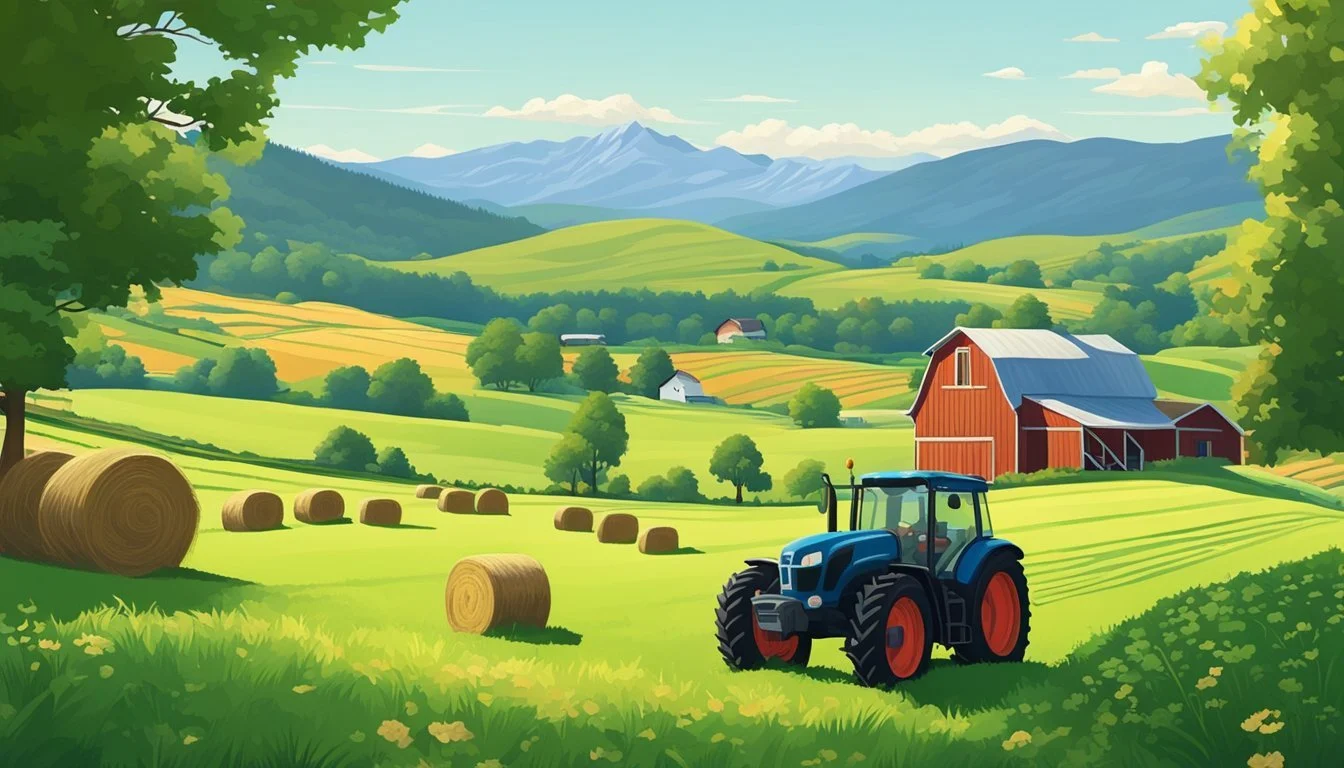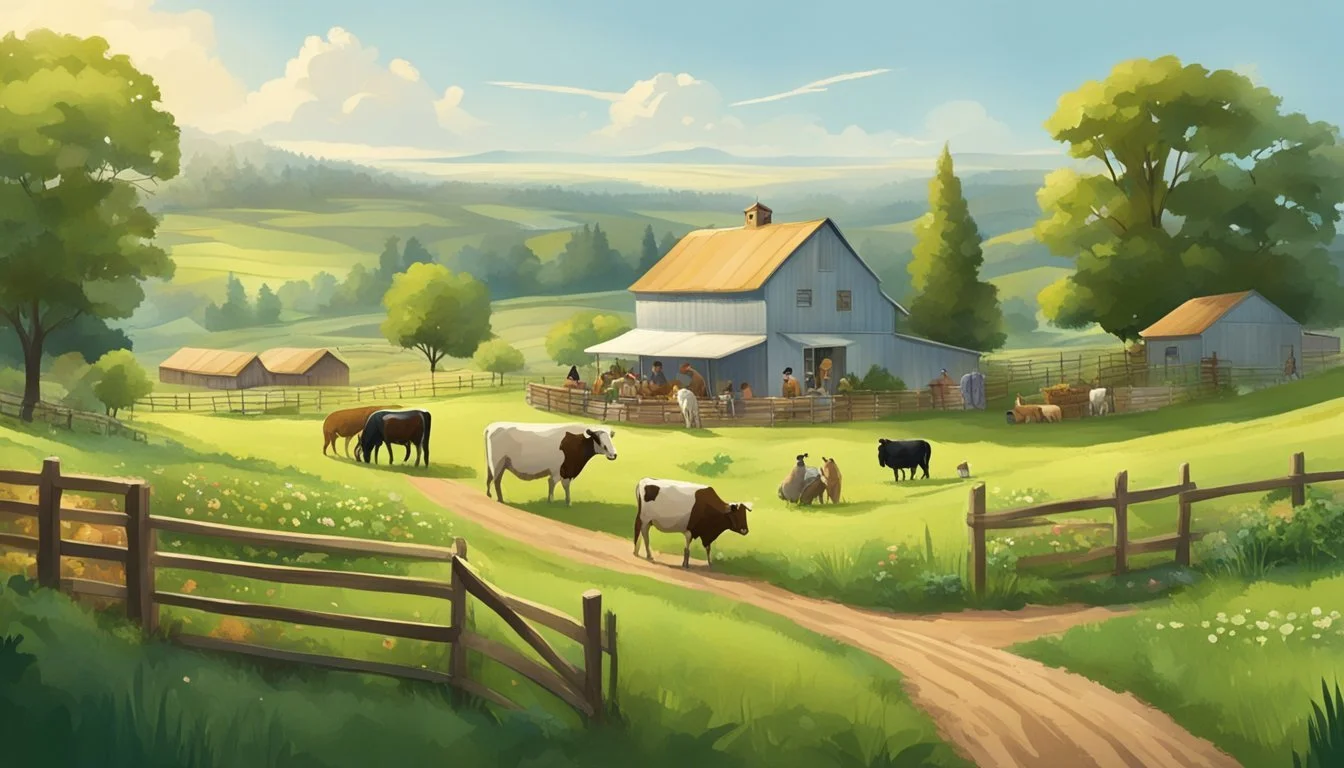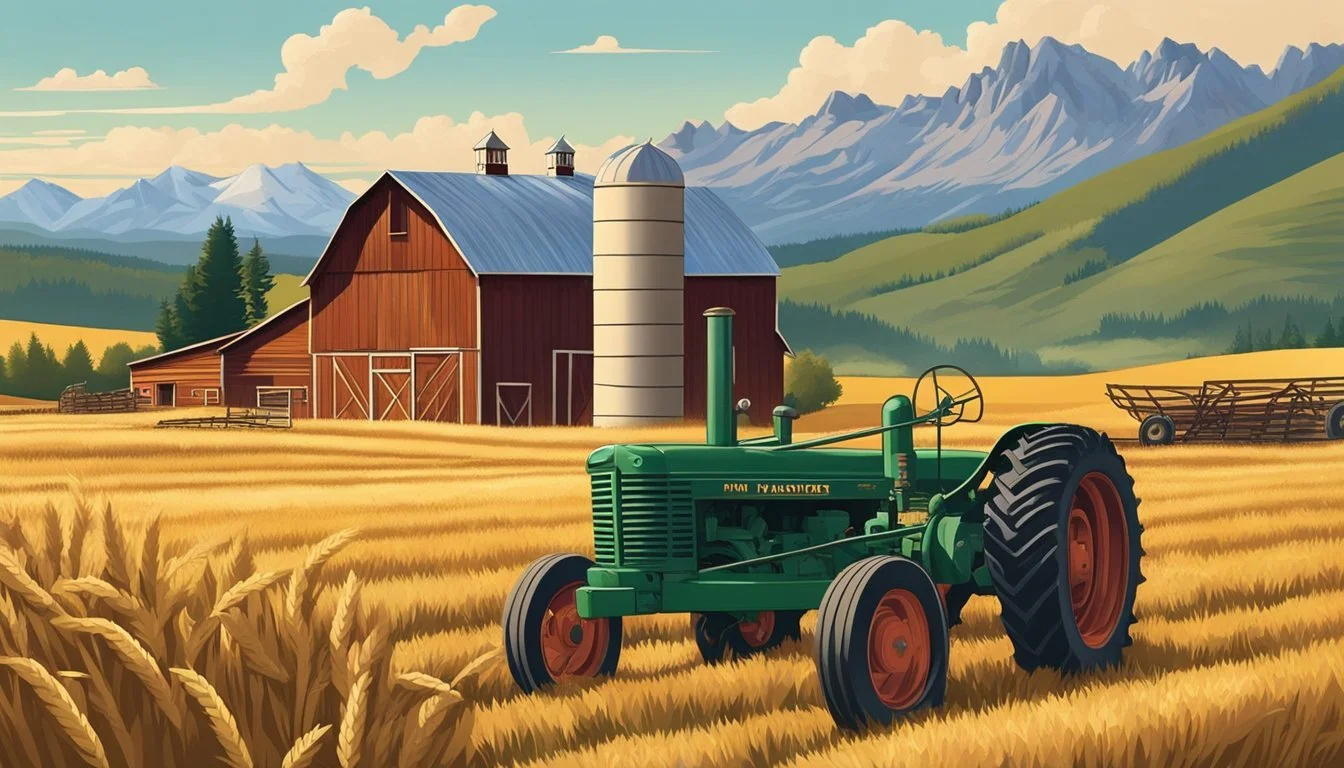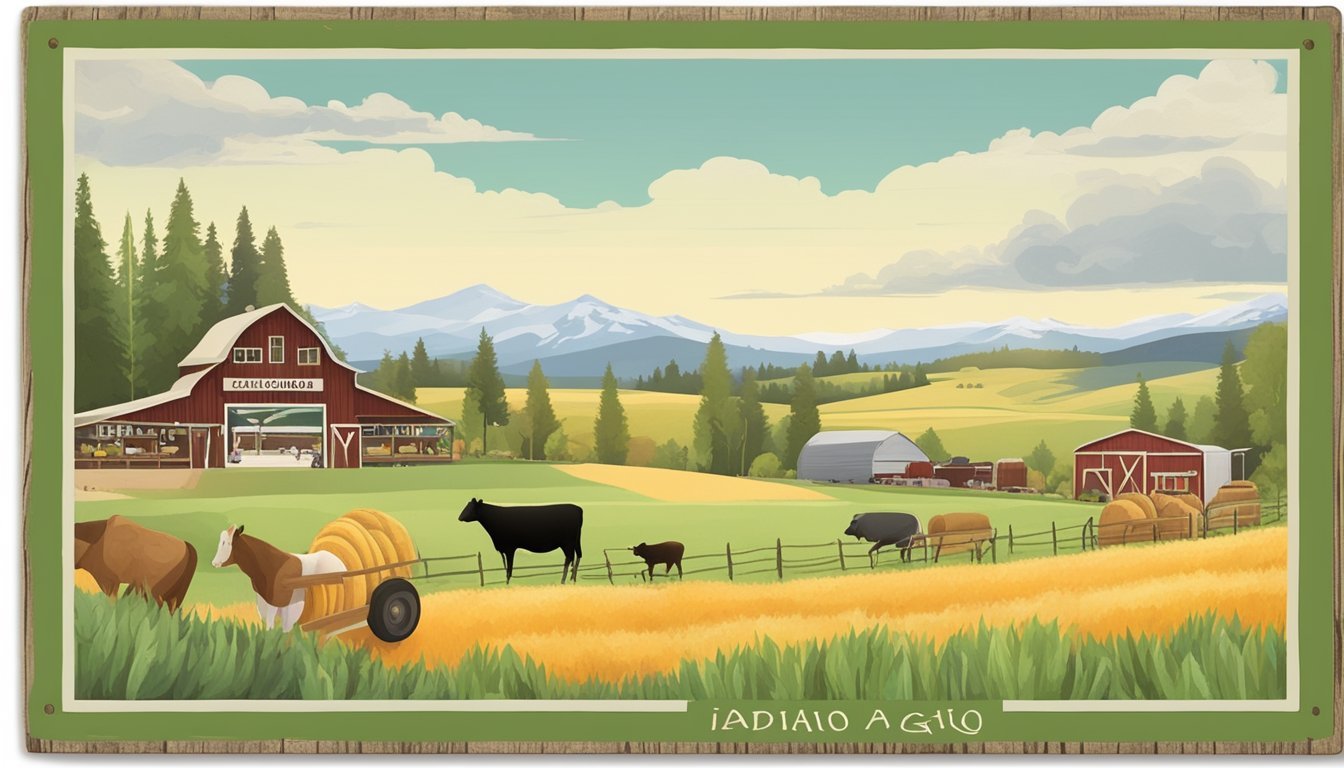Agritourism in Idaho
Unveiling the Gem State's Rural Charm
Agritourism is transforming the agricultural landscape of Idaho, providing a bridge between rural and urban communities. In Idaho, agritourism encompasses a range of activities that invite the public to experience and learn about farming and ranching firsthand. As a growing trend, agritourism not only allows visitors to connect with the state's agricultural roots but also stimulates local economies, supporting family farms and preserving Idaho's rich agricultural heritage.
These activities are not limited to the traditional farm visit; they also include educational programs, recreational opportunities, and direct sales of farm products to consumers. Idaho's diverse agritourism sector includes farm stays, farm-to-table dining experiences, historical and cultural tours, and hands-on experiences like picking fruits or navigating corn mazes. This variety caters to a broad audience, from families looking for educational outings to food aficionados and outdoor enthusiasts seeking authentic experiences.
Idaho's expansive farmlands and scenic ranches make it an ideal setting for agritourism, allowing visitors to immerse themselves in the bucolic beauty of the countryside while participating in sustainable travel practices. As this sector continues to flourish, it fosters a deeper appreciation for the food on our tables and the labor that goes into producing it, ensuring the legacy of Idaho's agricultural sector for generations to come.
Understanding Agritourism
Agritourism in Idaho combines agriculture with tourism, creating an educational and recreational experience that connects the general public to farming and ranching activities.
Definitions and Importance
Agritourism refers to a form of commercial enterprise that links agricultural production with tourism to attract visitors onto a farm, ranch, or other agricultural business for the purposes of entertainment, education, or active involvement in the activities of the farm or operation. In Idaho, this encompasses a range of activities such as:
Direct Sales: Purchasing products straight from the farm.
Education: Participating in experiences that teach about farming, like school tours.
Hospitality: Staying at a farm or enjoying on-farm dining.
Outdoor Recreation: Engaging in outdoor farm-related activities.
Agritourism is pivotal to Idaho's economy as it supports local agriculture, fosters appreciation for the farming lifestyle, and contributes to rural development. It also provides farmers with an opportunity for diversified income, which is crucial for the sustainability of farms.
Idaho Agritourism Promotion Act
The Idaho Agritourism Promotion Act outlines statutory definitions and sets a framework within which agritourism can operate within the state. The Act uses the following legal definition:
Agritourism Activity: Activities on a farm or ranch that allow public enjoyment and education about rural activities.
The statute not only promotes agritourism but also provides guidelines for liability, aiming to encourage farm owners to open their operations to the public by mitigating certain risks associated with agritourism.
By outlining the parameters within which agritourism can occur, this Act plays a crucial role in supporting the interface between Idaho's robust agricultural sector and the tourism industry, underscoring the state's commitment to both economic development and cultural preservation.
The Landscape of Agritourism in Idaho
Idaho is renowned for its robust agricultural sector, which has become a foundation for diverse agritourism experiences. The state leverages its rural charm and abundant farms to attract visitors, offering an authentic window into the country's agricultural life.
State Overview
Idaho's agritourism is framed by its vast open spaces and more than 80 mountain ranges, creating a picturesque backdrop for visitors. The state's farms offer direct sales and immersive experiences, which are integral to preserving Idaho’s agricultural heritage. With nearly 25,000 farms and ranches spread across the country, Idaho's agritourism is intrinsically linked to its produce, with potatoes being the most famous among them.
Notable Idaho Agritourism Facts:
Number of Agritourism Farms: 143
Farms with Direct Sales: 1,732
Combination of Direct Sales & Agritourism: 33 Farms
Major Agritourism Destinations
Idaho offers a variety of destinations for agritourism enthusiasts. From family-run farms to larger ranches, visitors can participate in activities such as ranch tours, cattle drives, and hands-on farm experiences.
Key Agritourism Destinations:
Ranch Tours and Cattle Drives: These provide firsthand experience with livestock and insight into the intricacies of ranch life.
Direct Farm Sales: Visitors can purchase produce directly from the farms, often including Idaho's renowned potatoes.
Outdoor Farm Experiences: Opportunities to engage in non-consumptive outdoor recreational activities amidst Idaho’s scenic landscapes.
These destinations play a pivotal role in supporting sustainable tourism within the state by showcasing Idaho’s agricultural practices and offering educational experiences to the public.
Agritourism Operations
Agritourism in Idaho encompasses a diverse range of activities that invite the public to experience and learn about farming and ranching firsthand.
Types of Farms and Ranches
Agritourism activities take place across various types of farms and ranches in Idaho. These operations include, but are not limited to:
Diversified farms: Engage in a variety of agricultural practices, often combining livestock and crop production.
Beef cattle ranches: One third of agritourism farms specialize in beef production.
Vegetable and melon farming: Provides an interactive experience for visitors, with opportunities to participate in harvesting.
Fruit and tree nut farms: Offer activities such as pick-your-own fruits and educational tours.
Agricultural Practices
The agricultural practices demonstrated at these sites vary widely, showcasing Idaho's rich agricultural heritage.
Recreational farming programs: These involve hands-on experiences where visitors can engage in day-to-day farm activities.
Environmental education: Many farms incorporate educational programs highlighting sustainable farming practices and conservation efforts.
Farms and ranches often combine agritourism with direct sales, giving visitors the chance to purchase fresh, locally-grown products. This dual approach not only enhances the visitor experience but also boosts farm income, with some farms generating significant revenue through these combined efforts.
Cultural and Historical Insights
Agritourism in Idaho intertwines the state's rich agricultural heritage with its historical narratives, offering visitors an immersive journey through time and culture.
Idaho's Agricultural Heritage
Idaho's farming roots run deep, with a plethora of family farms and ranch operations that preserve the state's past. Agritourism not only showcases Idaho's fertile lands but also its dedication to maintaining traditional farming practices. Visitors can witness:
Local Produce: The cultivation of diverse crops integral to the local economy.
Heritage Breeds: Farms raising Highland cattle and Tamworth pigs with methodologies passed down through generations.
Historic Sites and Tours
Guided tours through Idaho's rural landscapes often reveal historical milestones intertwined with the land. Key components include:
Historical Markers: Locations signifying past events, accessible during farm tours.
Educational Experiences: Opportunities to learn about the state's agricultural evolution from knowledgeable guides.
Engaging in Idaho's agritourism allows for exploration of both cultural significances and historical contexts, delivering an enriching experience that goes beyond the conventional tourist path.
Economic Impact
Agritourism is a substantial contributor to Idaho's economy, providing support to local businesses and generating significant employment opportunities.
Local Economy
In Idaho, agritourism has a significant role in fueling the local economy. The influx of visitors spending on accommodations, transportation, and activities translates into a daily economic boost:
Accommodations: $974M
Local Transportation: $746M
Entertainment: $615M
This spending helps sustain various sectors within the state, resulting in broad economic benefits.
Community Support
Agritourism in Idaho plays a pivotal role in the support and sustenance of the community. Through agritourism, many farms and ranches, which are often small family-run businesses, obtain a valuable income stream that bolsters their operational viability. The Economic Contribution of Idaho Agribusiness illustrates this support:
Total sales contributed by agriculture in 2019: $29 billion
Percentage of Idaho’s total economic output: 17%
Through community support, agritourism helps ensure the local economy thrives, directly benefiting the livelihoods of Idaho residents.
Experiential Opportunities
Idaho's agritourism invites visitors for up-close experiences with agriculture through guided farm tours and food produce samplings. These activities offer educational insights and authentic tastes of the region's agricultural heritage.
Guided Farm Tours
Guided tours in Idaho provide an informative journey through the state's diverse agricultural landscape. Visitors can learn about sustainable farming practices and witness firsthand the care that goes into producing food. Cable Creek Farm, located in Post Falls, is an example where guests can interact with Highland cattle and Tamworth pigs, surrounded by the serene backdrop of North Idaho mountains. Tours like these are often enriched with stories of the farm's history and future ambitions.
Food and Produce Sampling
Agritourism in Idaho is incomplete without tasting the fresh flavors of local produce. Farm-to-table dining experiences connect visitors with the source of their food, offering dishes made from ingredients harvested at their peak. Sampling events may include fresh eggs, organically grown vegetables, and other farm-produced delicacies. Such experiences not only tantalize the palate but also create a deeper appreciation for Idaho's agricultural roots.
Contributions to Agritourism
Agritourism is a vital component of Idaho's agricultural sector, enhancing economic opportunities and promoting the state's farming legacy. The industry's growth is largely attributed to the entrepreneurial endeavors of local farmers, ranchers, and the burgeoning presence of Idaho wineries, each contributing uniquely to its success.
Local Farmers and Ranchers
Farmers and ranchers in Idaho have broadened their income streams by offering agritourism activities. Such ventures include U-pick fields, farm tours, and on-site farm stays. These experiences enable visitors to engage directly with agricultural processes and appreciate the farm-to-table journey. By doing so, farmers and ranchers foster a deeper connection between consumers and their food sources, further instilling an understanding of Idaho's agricultural practices.
U-pick Fields: Encourages hands-on involvement and boosts sales of fresh produce directly to visitors.
Farm Tours: Educates the public on sustainable farming practices and the daily operations of a working farm.
On-site Farm Stays: Offers immersive experiences, increasing appreciation for rural lifestyles.
Idaho Wineries
Idaho's wine industry plays a significant role in the state's agritourism, with its scenic vineyards and acclaimed wines. The wineries engage in agritourism by conducting wine tastings, vineyard tours, and hosting wine-related events. These activities not only enhance the patrons' knowledge and enjoyment of Idaho wines but also contribute to the economic vitality of the sector.
Wine Tastings: Visitors sample local wines, often leading to direct sales and increased brand loyalty.
Vineyard Tours: Provides insight into viticulture and the winemaking process, highlighting Idaho's unique terroir.
Wine-Related Events: Festivals and workshops attract tourists and locals, creating community engagement and supporting regional tourism.
With unique contributions from farmers, ranchers, and wineries, Idaho's agritourism continues to develop as an integral element that complements the state's agricultural economy and cultural landscape.
Agritourism Marketing
Marketing strategies for agritourism in Idaho focus on showcasing the state's rich agricultural heritage while tapping into the growing interest in farm-to-table experiences and rural tourism.
Promoting Agritourism
Effective promotion of agritourism takes a multifaceted approach. Key marketing tactics include online presence through websites and social media platforms, participation in agricultural fairs, and engagement in community events. The Idaho Agritourism Promotion Act supports these initiatives, ensuring legal frameworks align with marketing efforts to streamline the promotion process. The Act helps to safeguard and promote the industry, ensuring that travelers and locals alike are aware of what Idaho's agritourism has to offer.
Target Demographics by Zip Code
The understanding of target demographics is crucial for the success of marketing efforts. Agritourism businesses often focus on visitors from specific zip codes that are associated with higher income levels and a demonstrated interest in agricultural and local food experiences.
83201: This area includes Pocatello, which boasts a population interested in outdoor activities and local cultural experiences.
83702: This Boise zip code captures a demographic that values sustainable living and regularly participates in local events.
By targeting these zip codes through both physical and digital marketing campaigns, agritourism businesses can efficiently allocate their marketing resources to reach the most receptive audiences.






